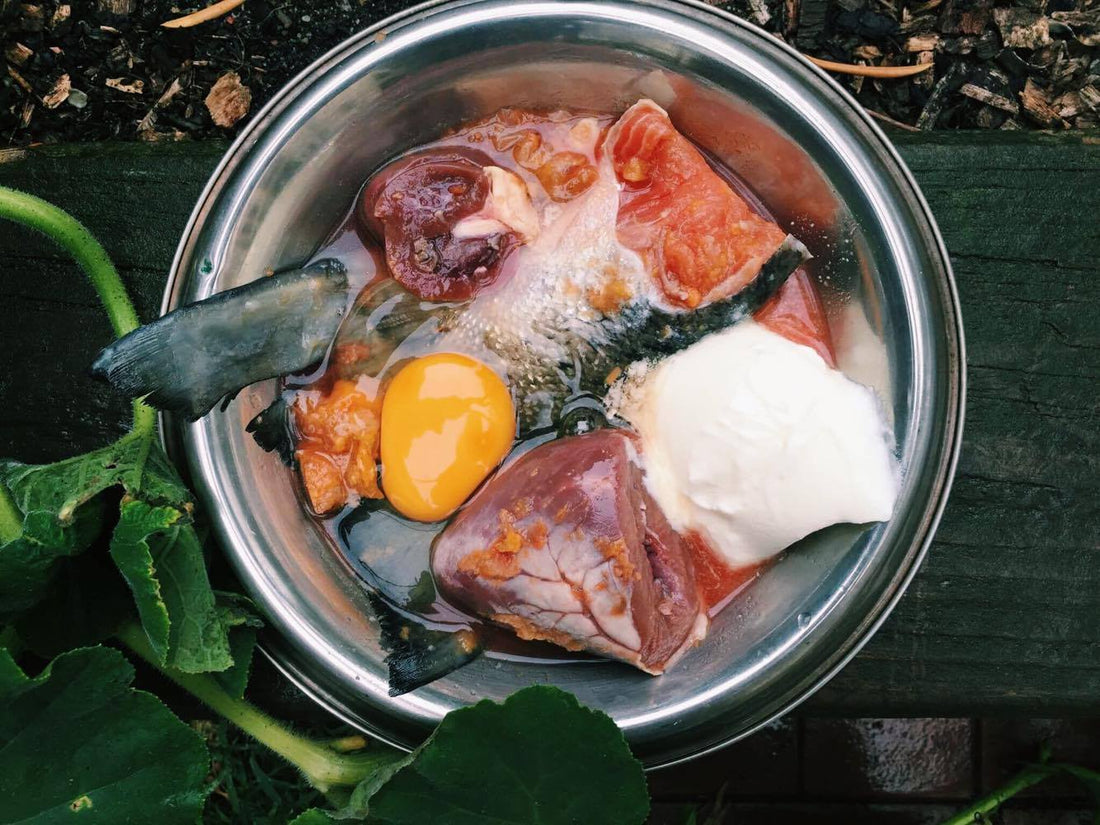
A-Z of Natural Foods for Dogs
min read
There are SO many more than 26 topics I could cover on the subject of natural foods for dogs, but just for fun, here is an A – Z.
Alfalfa is a powerful natural supplement that contains vitamins A, B1, B3, B5, B6, B12, C, D, E, K and U, beta-carotene, biotin, folic acid, calcium, phosphorus, potassium, magnesium, iron, zinc, copper, protein, trace elements and fibre.
Bones are a crucial addition to a natural diet for your dog. They are a vital source of calcium, they clean teeth and they provide your dog with important mental stimulation.
Calcium is the most abundant mineral in the body and it plays an important role in the health of bones and teeth, as well as heart function. Calcium needs to be balanced with phosphorous, ideally in a 1:1 ratio.
Dulse is a sea vegetable. Sea vegetables are one of the best sources of trace minerals on the planet.
Eggs are a near perfect food for dogs owing to the fact that they contain all ten of the essential minerals dogs require and a host of other nutrients, including vitamins A, D3, E, B2, B3, B5, B6, B12, K, iodine, choline, calcium, biotin, potassium, sulphur, folic acid, phosphorus, iron, selenium and zinc.
Fruit may be added to a natural diet in small amounts as a supplementary source of vitamins.
Garlic is controversial. In very small doses it’s considered an anti parasitic and immune booster, but too much can cause haemolytic aenemia. It should never be fed to toy breeds or cats.
Honey may assist with seasonal allergies when fed in small doses. In order to be effective the honey must be local, organic and raw (although all organic honey is raw).
Immune system health is crucial to a dog’s long and happy life. A balanced diet of fresh, natural, species-appropriate foods provides the building blocks for a strong immune system. These foods are easily digested and offer a steady stream of readily available nutrients to support immune system health.
Joint health may be improved by a natural diet free from inflammatory foods, like carbohydrates.
Kangaroo is a lean, high protein and sustainable meat that is well suited for a natural canine diet.
Love is the reason we do this (it’s corny, I know, but it’s true).
Minerals can seem overwhelming, but supplementation is rarely necessary for a healthy dog eating a balanced natural diet.
Necks are a good bone to feed, which come in lots of different sizes for different sized dogs.
Offal is an important addition to a natural diet as these cuts of meat are often very high in critical nutrients.
Puppies caloric requirements are around double that of adult dogs, relative to body weight.
Quinoa is trendy and nutritious for humans, but not something your dog needs to eat. Protein from plant based sources are not easily obtained or digested by dogs.
Raw is best! Usually. All animal protein (meat and eggs) should be fed to dogs raw as heat alters the amino chain. Dogs can easily digest raw meat and the hydrochloric acid in their stomach prevents them from becoming unwell. Some vegetables, however, do need to be cooked, in order to do the digestive work dogs cannot do (because their digestive system is primarily designed for eating raw meat).
Sesame is a good source of good a source of vitamins B1, E, zinc, folic acid, copper and selenium. Tahini is a paste made from crushed, whole sesame seeds that can be easily added to food, or fed as a treat.
Tripe is considered a “superfood” for dogs, rich in digestive enzymes and probiotics. These nutritional benefits are only found in green tripe, however, so steer clear of the bleached white one in the supermarket.
The Unknown. The reality is no one knows exactly what “complete and balanced” is, other than what is set out by for-profit companies with ties to the processed pet food industry and to which manufacturers aspire through heavy nutritional supplementation.
Variety is the key to successfully feeding a natural diet. Taking into consideration what we don’t know (see Unknown), the best way to combat this is to offer a variety of different food sources that will provide all of the nutrients dogs require, balanced over time.
Wolves are the species that the domestic dog most closely resembles, both anatomically and in terms of behaviour. When feeding your pooch a natural diet, the goal is to replicate the prey based diet of the wolf and other wild canids, as close as practically possible in the domestic environment.
Xylitol is highly toxic for dogs and it’s important to make sure it’s not an ingredient in anything you feed them. Some manufacturers of peanut butter in America have begun adding it as a sweetener so keep an eye out (or even better, feed your dog natural peanut butter without sweeteners or salt).
Yeast can cause severe irritation in dogs if an overgrowth occurs. Yeast feeds on sugar, so an overgrowth may be reduced by a sugar free diet. This doesn’t just mean added sugars, but also carbohydrates, which break down into sugars.
Zinc is a mineral that can help with boosting the immune system, glucose conversion, nerve transmission, muscle contraction and hormone secretions².
If you’re interested in knowing more about any of these topics or how you can include them safely in your dogs’ diet, I have a few products in my shop or you can shoot me an email.
-
Nutrient Density: Why It Matters More Than Nutrients http://www.dogsnaturallymagazine.com/nutrient-density-matters-more-than-nutrients/
-
Olsen L (2010) Raw and Natural Nutrition for Dogs, Revised: The Definitive Guide to Homemade Meals. Dharma Café Books. Berkley, California.